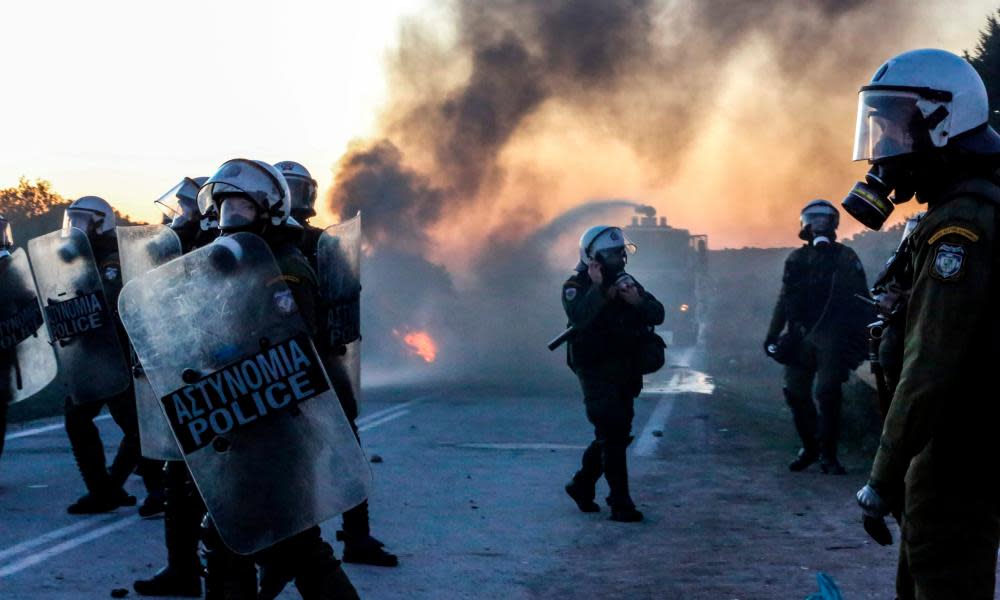Greek authorities scramble to calm tensions over migrant detention camp

Greek authorities are desperately trying to contain mounting tensions over government plans to construct migrant detention camps on the north Aegean islands after a night of clashes between residents and riot police on Lesbos and Chios.
Security forces used teargas and stun grenades to disperse crowds gathered at sites designated for the controversial facilities. In Chios, a local mayor and a priest were rushed to hospital after collapsing as a result of the toxic fumes.
With islanders voicing dismay at the scale of the violence, local unions hit back with debilitating protest strikes on Tuesday. “Nobody should go to work, nobody should go to school, no shop should open,” Lesbos’s central labour force announced.
Related: 'I get a lot of love': how hope survives in the hell of Moria
“We call on all workers, the people of Lesbos, bodies and associations to stand against government plans to turn our island, and other Aegean islands, into a vast prison of human souls.”
At least two people were taken to hospital later on Tuesday after more violence erupted at roadblocks set up to prevent bulldozers and other machinery reaching plots expropriated by the government for the facilities.
Caught up in the clashes, Yiannis Bournous, an MP with the opposition Syriza party on Lesbos, deplored what he described as “an unprovoked and violent attack of riot police against protesting citizens”, likening the confrontation to an assault on democracy.
Demonstrations are planned for later in the day. Leftwing, pro-immigrant supporters also declared they would rally in solidarity in Athens.
The tumult underscored the resistance the centre-right administration now faces in its quest to construct “closed” facilities to accommodate the ever-growing numbers crossing over from Turkey in a bid to enter Europe via Greece’s outlying isles.
More than 43,000 people are currently stranded on Lesbos, Samos, Chios, Leros and Kos, the main gateways to the country. Over 20,000 are on Lesbos, the island long on the frontline of the influx, with most forced to endure the unsanitary and vastly overcrowded conditions of the infamous open-air camp of Moria, a short drive from Mytilene, its capital.
The vast majority of those entering the EU from the war-torn Middle East, Asia and Africa came via the islands last year with an overwhelming 99% applying for asylum, according to Greek immigration authorities.
Hamstrung by a containment policy determined by Brussels, they are forced to remain on the islands until asylum requests are processed by a system already buckling under the pressure. Holding facilities on the outposts were originally designed to host no more than 5,400 people.
Government officials, clearly shamed by international criticism of the camps, say the new detention centres will finally put an end to the woeful images that have emerged from Greece. Constructed to host around 5,000 people each, expectant asylum-seekers will share the installations with those scheduled for deportation.
By fast-tracking the asylum process, the administration argues the detention centres will help accelerate what is needed most: decongestion of the isles. Locals, who have already borne the brunt of migratory flows, fear the facilities will ultimately become permanent.
On Tuesday the administration of the prime minister, Kyriakos Mitsotakis, vowed to forge ahead with the scheme despite the protests and mounting expressions of consternation from the opposition.
Describing the current camps as “public health bombs”, the government spokesman insisted the new installations would ultimately be in the interest of the islands. As he spoke defence department bulldozers driven by soldiers could be seen clearing some of the land.
“We are asking local residents to understand that these closed facilities will benefit the country and their communities,” the government spokesman Stelios Petsas told Open TV. “We will build these closed centres but also close the existing open ones. That is the government’s promise.”
International aid groups also expressed alarm over the rising tensions following Monday night’s clashes.
“It has reached an explosive point for both locals who have shown remarkable solidarity towards refugees and asylum seekers living in the conditions that they live,” said Nikolas Panagiotopoulos area manager of the International Rescue Committee.
“There is an urgent need for de-escalation. We firmly believe that more dialogue is needed between local government and central government for a sustainable solution,” he told the Guardian. “It is clear the north-east Aegean islands cannot shoulder this responsibility. The EU needs to step up in solidarity because Greece cannot cope on its own.”


